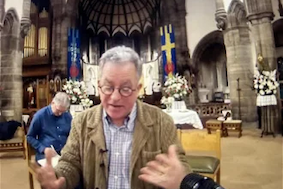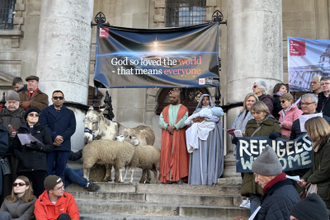South African Reflection: Do we trust the Spirit?

Annemarie Paulin-Campbell
Source: Jesuit Institute, South Africa
While we may not all be as aware of it in the South African context, the church is very polarised in many parts of the world. This polarisation is increasingly evident as we move towards the upcoming Synod on Synodality in Rome from 4 - 29 October. This meeting is the next step in a process that has allowed people at the parish level to listen to each other and reflect on their experience and where they sense the Holy Spirit is at work in the church. The Synod will reflect on what has emerged from the process on the different continents.
The Synod journey is seen as a great sign of hope by many who long for change in the church. On the other hand, reactionary church leaders are pushing back against it strongly. The Synod process has been described as a "hostile takeover" by Cardinal Gerhard Muller and a "toxic nightmare" by the late Cardinal George Pell.
Cardinal Raymond Burke, who is influential, especially among conservative Catholics in the United States, has written a foreword to a newly-released book called The Synod Process is a Pandora's Box. The book is a compilation of 100 questions and answers attempting to show how the Synod may do grave harm to the church. There is evidently considerable fear among some that this worldwide discernment process that values ordinary Catholics' voices might result in "confusion," "error," and even schism. There seems to be a fear that inclusivity may diminish the "purity" of the church.
In the past few days, comments made by the Pope on 5th August - at a meeting with the Jesuits in Portugal during his visit to Lisbon for World Youth Day - were published by the Jesuit journal La Civilta Cattolica. The Pope had strong words about those who stubbornly oppose change in the Catholic Church. He particularly referred to reactionary groups in the United States who fear Pope Francis's message that the church should be a home for all. They have reacted against Pope Francis' inclusion of LGBTQI + Catholics, his giving of significant roles of responsibility to women in the Vatican, extending voting rights at the Synod, and his emphasis on issues such as climate change and social justice.
At this recent meeting, he spoke firmly, saying: "I want to remind these people that backwardism is useless, and it is necessary to understand that there is a correct evolution in the understanding of questions of faith and morals." He gave examples of how church teaching evolves, including teaching on slavery, the death penalty and the possession of the atomic bomb, all of which were once seen as acceptable by the church and are no longer. Pope Francis said that as the other sciences evolve, they contribute to the church's growth in understanding.
It gives renewed hope for the church's engagement with the significant issues of our own time to see Pope Francis reiterating that church teaching is not static but continues to be revealed by the Holy Spirit. May love cast out fear so that we can listen, pray and discern a way forward together and not suffocate the Spirit by a refusal to be open to God, who is always "doing a new thing." (Isaiah 43:19)
Follow The Jesuit Institute on Twitter @JesuitInstitute


















